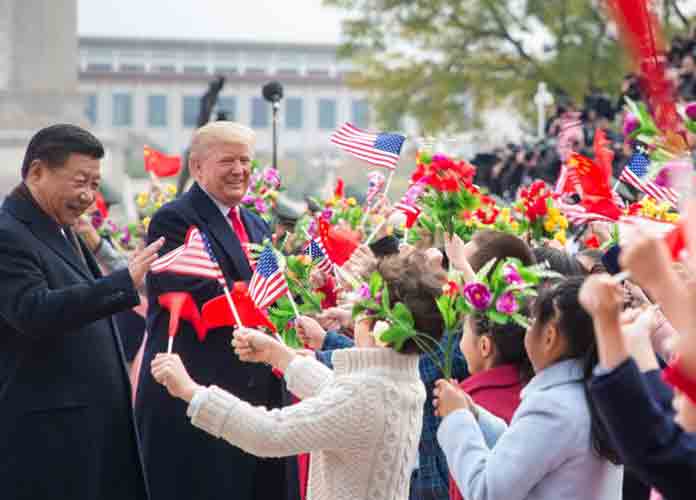

President Donald J. Trump and First Lady Melania Trump arrive in China | November 8, 2017
China announced on Monday that it will raise tariffs on $60 billion in U.S. goods at the start of next month, which represents a 5 to 25 percent tariff. This is an addition to the duties that are already in place, marking the latest tactic in the trade conflict between the two economic giants.
The announcement comes right after President Donald Trump warned China against retaliating on the hiked tariffs that the U.S. put on $200 billion of Chinese goods last week. Trump publicly warned Beijing to not retaliate, stating it “will only get worse” for China if it takes action.
Beijing has said that it will take “necessary countermeasures” in response to the new tariffs, but had not made a move until Monday’s announcement.
The increased tension between the two countries was a result of Beijing reneging on a number of commitments it had agreed to, U.S. officials said. There have been many high-level negotiations put in place to break the impasse, but no concrete resolutions have been achieved.
Subscribe to our free weekly newsletter!
A week of political news in your in-box.
We find the news you need to know, so you don't have to.
Trump is unwilling to back down from the conflict because he believes the duties that are placed on Chinese goods means that China will pay more money directly to the U.S. Treasury.
In an interview on Sunday, White House economic adviser Larry Kudlow disagreed with this view and acknowledged that American businesses and consumers will suffer from the increase in tariffs.
This assessment is in line with what most mainstream economists believe would happen in the case of increased tariffs. These tariffs can be considered taxes that are paid by importers, namely U.S. companies, that bring in products from China. These costs are usually passed on to consumers in the form of higher prices, which may drive down demand for Chinese imports.
SLIDESHOW: TOP DEMOCRATS RUNNING FOR PRESIDENT IN 2020
Trump suggested a solution to the tariff situation: U.S. companies could simply avoid them by purchasing their goods from countries that are not subject to the U.S. tariffs.
But rerouting supply chains to avoid purchasing goods from China is costly and time consuming, which could also force companies to raise prices to consumers. Furthermore, companies that import from China might do so because the goods are unavailable elsewhere or would be far more expensive otherwise.
Tesla CEO Elon Musk has apologized for his public falling out with President Donald Trump.…
Sen. Chris Murphy (D-Connecticut) has launched a new political action committee (PAC), the American Mobilization…
Brit Hume, the Fox News chief political analyst, contradicted President Donald Trump's statement to the…
FBI Director Kash Patel has revealed that his home was "swatted" last week. "As Director…
Commerce Secretary Howard Lutnick announced the launch of the $5 million "gold card" U.S. residency…
In a new study, nearly 50% of Tesla owners report their vehicles have been vandalized,…